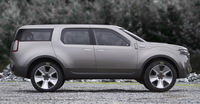2011 Ford Explorer Earns IIHS Top Safety Pick; Delivers Suite of Standard Safety Features
SEE ALSO: Ford Buyers Guide
SEE ALSO: 2011 TOP SAFETY PICK Winners
DEARBORN, Mich., Dec. 22, 2010; The reinvented 2011 Ford Explorer, which offers a suite of innovative safety technologies, is the latest Ford vehicle to earn a Top Safety Pick rating from the Insurance Institute for Highway Safety.
Ford now has eight vehicles on the road in the U.S. that have earned Top Safety Picks, which adds to Ford's leading number of top U.S. safety ratings ever.
"The Ford Explorer sets a new standard for high-tech safety innovation," said Sue Cischke, Ford group vice president of Sustainability, Environment and Safety Engineering. "The Explorer offers several new innovative technologies, including available industry-first production rear inflatable seat belts, and Curve Control, which can help drivers maintain control of a vehicle if they enter a curve too quickly."
To earn a Top Safety Pick, a vehicle must receive a rating of "good" in offset frontal-, side- and rear-impact crash tests and roof strength evaluations, as well as offer electronic stability control.
Initial demand for the driver-aid technologies on the new 2011 Explorer has been strong. Of the first 19,000 orders received:
- 22 percent include adaptive cruise control with forward collision warning, active park assist and rain-sensing wipers
- 40 percent include BLIS® (Blind Spot Information System) with cross-traffic alert
- 87 percent include rear view camera
"Explorer has a history of safety innovation, from side-curtain airbags to AdvanceTrac® with RSC® (Roll Stability Control™), and now offering the world's first production rear inflatable seat belts," said Craig Patterson, Explorer marketing manager. "Explorer customers value safety and security. Safety features are one of the top reasons customers cite for their purchases of Explorer and SUVs in general."
World's first production inflatable rear seat belts
The new Ford inflatable rear seat belts spread impact forces across five times more area than conventional seat belts to reduce pressure on the chest while helping to control head and neck motion. The auto industry's first-ever production inflatable seat belts are designed to provide additional protection for rear-seat occupants, often children and older passengers who can be more vulnerable to head, chest and neck injuries.
Explorer's Curve Control
Ford is pioneering the next frontier of safety with crash-avoidance innovations such as Curve Control, designed to help drivers maintain control of their vehicle when taking a curve too quickly, a situation found to contribute to approximately 50,000 crashes on curves each year in the U.S. alone.
Curve Control senses when a vehicle is entering a curve too quickly, and can apply four-wheel smart braking to reduce vehicle speed by up to 10 mph in approximately one second and help drivers follow their intended path.
Additional driver-assist and safety features
"The new Explorer delivers features that both help prevent a crash and help minimize occupant injuries when a crash is unavoidable," said Erika Low, Explorer safety manager. "It's a comprehensive safety story from bumper to bumper."
The new Explorer comes equipped with technologies to help prevent crashes – from parking lot fender benders to high-speed collisions – by warning drivers of the potential for a crash. Driver- aid and safety technologies include options such as:
- Adaptive cruise control, which slows the vehicle to adapt for traffic conditions and maintain a preset distance between vehicles
- Collision warning with brake support, whichhelpsreduce speed, automatically pre-charges brakes, provides a red warning light on the windshield as well as an audible beep to help drivers stop more quickly when the system detects a collision is imminent
- BLIS with cross-traffic alert, whichhelps detect vehicles in blind spots during normal driving, as well as traffic approaching from the sides when reversing out of parking spots
- Tire Pressure Monitoring System, which alerts drivers when it senses tire pressure is low
- MyKey, whichallows parents to limit speed and audio volume in their vehicles and is designed to help parents encourage safe driving habits in their teens
Structural safety and crash protection
Explorer features a unibody configuration body structure with nearly half of the stiff shell comprised of high-strength steels, such as boron. A-pillars, rocker panels and front beams are made out of boron steel for both increased strength and reduced weight. This structure was designed and developed to meet global crash standards.
Explorer features Ford's Trinity front crash structure, so named for its three components designed to absorb and redirect crash forces in the event of an incident.
When a crash becomes unavoidable, Explorer relies on a class-leading array of airbags to protect occupants. Two front and two side second-generation airbags are joined by a Safety Canopy® consisting of side-curtain airbags for all three rows of passengers. Personal Safety System™ safety belts feature pretensioners and an energy management system with adjustable D-ring height in the first row.
Other Ford vehicles that have earned a Top Safety Pick rating include:
2011 Ford Taurus
2011 Ford Fusion
2011 Ford Fiesta
2011 Ford Flex
2011 Lincoln MKS
2011 Lincoln MKT
2011 Lincoln MKZ
About Ford Motor Company
Ford Motor Company , a global automotive industry leader based in Dearborn, Mich., manufactures or distributes automobiles across six continents. With about 163,000 employees and about 70 plants worldwide, the company's automotive brands include Ford, Lincoln and Mercury, production of which has been announced by the company to be ending in the fourth quarter of 2010. The company provides financial services through Ford Motor Credit Company. For more information regarding Ford's products, please visit www.ford.com



